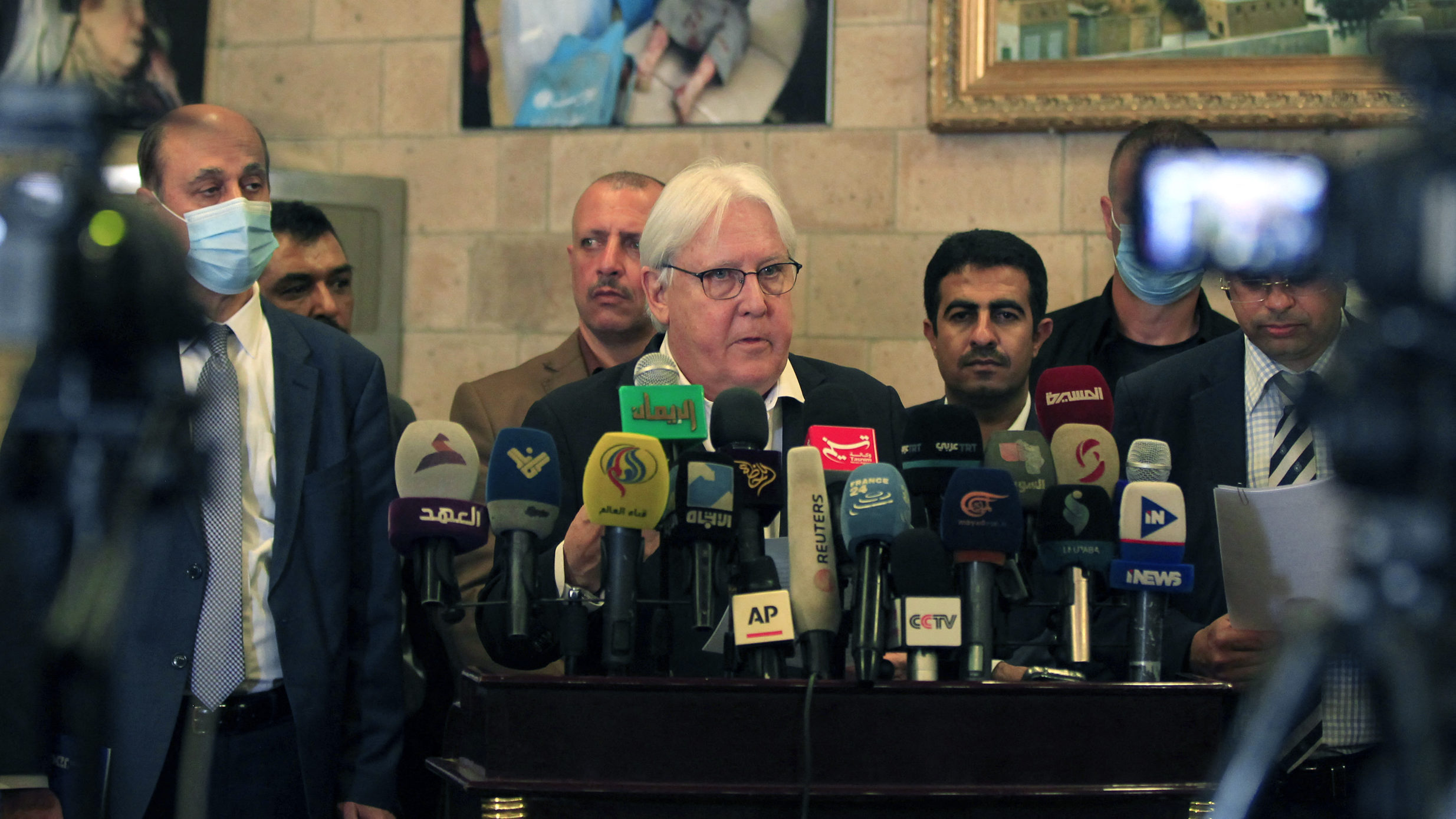4th Time a Charm? UN to Appoint Yet Another Special Envoy to Yemen
World body takes the heat as Houthis, government accuse successive post-holders of partiality
Yemenis are awaiting the UN’s announcement of its fourth special envoy to Yemen, hoping he or she will bring all the warring parties back to the dialogue table and to the path of peace in a country torn apart by seven years of war.
The outgoing envoy, British diplomat Martin Griffiths, was appointed in February 2018 and is expected to stay in the post until a successor is found, after which he will become the UN’s humanitarian relief coordinator, based in New York.
Mabkhout C., a Yemeni who works in hardware sales, told The Media Line that Yemenis do not want the UN to interfere in their affairs. The country “did not gain anything from the UN envoys except a deepening of the wounds and driving people’s views apart,” he said.
“The decision to stop the war is not in the hands of the Yemenis, but in the hands of an international power,” he added.
Ali al-Malsi, a Yemeni academician, criticized what he called the UN envoys’ failure to properly diagnose the crisis and said the world organization must avoid repeating the mistakes made by the previous UN envoys and identify a figure who can correctly analyze the problem and present it to the Security Council so the latter can put pressure on the regional powers involved in the war.
Failed UN efforts
On June 15, Griffiths announced during a Security Council session that his efforts to find a solution to the crisis had failed and that the Yemeni parties must have the courage to choose the path of peace.
“A mediator is not responsible for the war nor for the peace. His – or her – privilege is not to have the power to end the war, despite a common assumption to the contrary. The mediator’s privilege is to present to the parties the ways the war can end. And again so far in vain,” he said.
Journalist Alia Youssef told The Media Line that Griffith “found himself in a war with the political parties.
“The Ansar Allah group [aka the Houthi rebels] accuses the UN envoy of siding with the IRG [internationally recognized government] and not pressuring it to accept some issues, and that he always acquiesces to it without referring to the humanitarian rationale in the country in his views,” Youssef said.
On the other hand, the IRG accuses Griffiths of not disclosing the “Houthis’ obstruction” of the peace efforts and tending in many cases to accept the movement’s views.
“This has made it impossible for the UN envoy to find a common ground on which to start building the peace, the same problem suffered by his predecessors in this task,” Youssef said.
What have the UN envoys achieved?
Three men have held the position of special envoy of the UN secretary-general for Yemen during the period of the civil war. The first, Moroccan UN diplomat Jamal Benomar, served from April 2011 to April 2015. He resigned due to opposition by some political parties to his serving in the post, less than a month after Saudi Arabia intervened in the civil war.
Following that, Ismail Ould Sheikh Ahmed, a Mauritanian diplomat and politician, held the post. In June 2017, the Houthis accused him of having abandoned neutrality and warned him to never come to Yemen again. He stepped down in February 2018 without achieving any real steps toward peace.
Griffiths was able to return the parties to the conflict to the dialogue table in 2018, in Stockholm, after a break of more than two years.
Political writer Salem Hafeez said Griffiths came the closest to building the parties’ confidence in accepting a comprehensive political dialogue that guarantees everyone satisfaction of their claims, by virtue of his own international acceptance and his previous relationship with the member states of the Security Council.
However, Hafeez added, Griffiths was unable to address sensitive political issues during his tenure and merely focused on building confidence between the parties, at the cost of failing to pressure them to discuss humanitarian, economic and political matters.
This was evident in the envoy’s soft language and his briefing in the Security Council, Hafeez said. “In the Yemen crisis, the envoy’s nationality, previous actions, and relationships do not matter as much as that he have a strong personality to assert his ideas, pressure [the parties] and disclose the [identity of the] obstructing parties.”
Hafeez opined that Benomar was the best of the three envoys and would have had greater success if he had the opportunity that Griffiths was given.
‘The world’s worst humanitarian crisis!’
“Three envoys and the worst world’s humanitarian crisis!” journalist Samah Lotf decried, adding that “the United Nations should consider appointing a fourth envoy to Yemen.
“Three envoys to Yemen could not dive into the political issues that would solve the Yemeni crisis,” he added.
Lotf said the UN envoys limited their work to sterile political negotiations, with their biggest achievement being the prisoner exchange agreement, of which only a small part was implemented last year while the other issues remain on hold.
The Yemen war pits the de facto authority (DFA) Ansar Allah group against the internationally recognized government backed by the Saudi-led Arab coalition. The conflict has resulted in the killing and wounding of hundreds of thousands of Yemenis, with tens of thousands of others held captive. According to the United Nations, Yemen faces the world’s worst humanitarian crisis.

